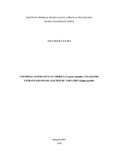Controle alternativo da tiririca (Cyperus rotundus) utilizando extrato aquoso do alecrim de tabuleiro (Lippia gracilis)

Visualizar/
Data
2020-02-20Autor
Xavier, Davi Moura
http://lattes.cnpq.br/1257992767724288
Metadado
Mostrar registro completoResumo
The sedge is a weed with an efficient multiplication system, and conventional control methods are becoming less recommended, as they require the use of products that are highly harmful to the soil and, consequently, to human health. Thus, there is a need to create alternative methods of control more effective, which do not present contamination or that they are minimal, as for example, it is possible to use the knowledge of allelopathy applied to the management of weeds. Therefore, the objective of this work was to evaluate the effect of the aqueous extract of the rosemary-of-board (Cyperus rotundus) on the nutsedge (Lippia gracilis), as an alternative form of management and its inhibition. The experiment was carried out from April to June 2019, installed and conducted in the seedling nursery of the IFRN - Campus Ipanguaçu, using a completely randomized experimental design with four replications, and applying dosages of aqueous extract of the rosemary of the board at 0 %, 25%, 50%, 75% and 100%. Each pot with substrate containing 10 bulbs was considered as an experimental plot. The evaluated characteristics were: percentage of live plants (NV) and number of tubers (NT). The data obtained were submitted to regression analysis and the response curve was adjusted with the aid of the AgroEstat program. The linear model adequately described the relationship between the dose and the characteristics evaluated, with the value of the variables decreasing with the increase in the dose of rosemary extract. The results demonstrated a significant effect, with a liner effect at 100% of EA under the sedge plants inhibiting their development, demonstrating to be a promising alternative in the study to combat weeds, opening new possibilities for research.



